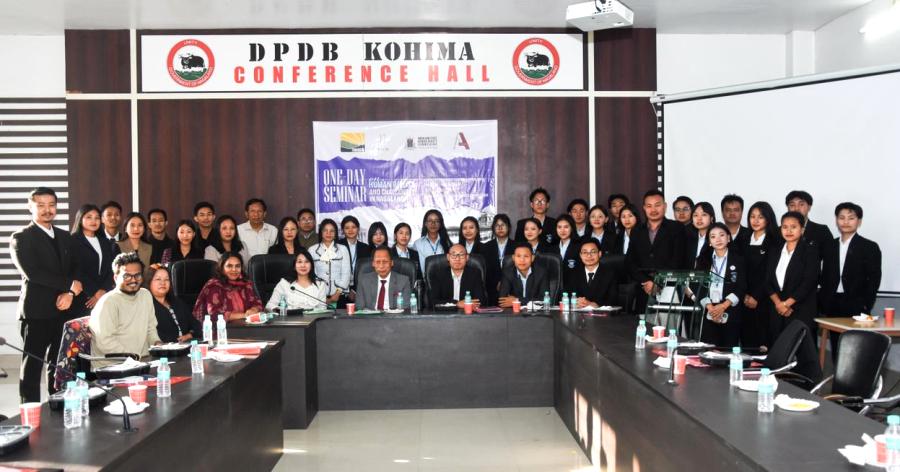Nagaland State Human Rights Commission chief Justice Songkhupchung Serto said human rights are most discussed but least practised at a Kohima seminar.
Share

DIMAPUR — The Northeast Support Centre and Helpline–Northeast Law Network (NESCH–NELN), in collaboration with the Nagaland State Human Rights Commission (NSHRC), organised a one-day seminar on “Human rights and challenges in Nagaland” on October 25 at the DPDB Conference Hall, Kohima.
The seminar was attended by leaders of various civil society organisations (CSOs), students’ unions, law students, students from St. Joseph Autonomous College, Jakhama, and members of the Avaazein Foundation, according to a press release.
Justice Songkhupchung Serto, chairman of the Nagaland State Human Rights Commission, delivering the inaugural speech, remarked that human rights remain one of the most discussed but least practised subjects.
Highlighting the genesis of the Universal Declaration of Human Rights, he noted that the phrase “All human beings are born free and equal” in Article 1 is credited to Hansa Mehta, an Indian delegate, who replaced the earlier phrase “All men are born free and equal”.
He emphasised that respect for human rights is the foundation of peace, which leads to progress and development. He shared that in the past two years, the NSHRC had inspected hospitals, public schools, and the public distribution system, besides investigating atrocities by state authorities, and recommended improvements in infrastructure, manpower, medicines, and testing facilities.
Also read: Nagaland to host 22nd CPA India Region Zone-III conference
The commission also took up the issue of minimum wages, observing that while all northeastern states had revised daily wages regularly over three years, Nagaland had not done so in five years. It has therefore recommended to the state government to revise the rates for the welfare of workers in the unorganised sector.
Justice Serto mentioned that the commission had enquired into the custodial death case in Chümoukedima and recommended a compensation of INR 5 lakh for the victim’s family, which the government had paid, along with recommendations for upgrading jail infrastructure.
He added that the commission had advised the state government to implement the Organ Transplantation Act to enable life-saving procedures. The government had taken positive steps in this regard, he said, expressing hope that the facilities would soon be available. He urged participants to make use of commissions and institutions for redress of rights.
Dr. Alana Golmei, advocate and general secretary, NESCH, presented an overview of human rights violations faced by people from the Northeast in metropolitan cities.
Read more: Traffic restrictions announced for National Red Run 3.0 in Dimapur
She highlighted that despite being Indian citizens, people from the region face racial discrimination, harassment, sexual assault, physical assault, murder, workplace sexual harassment, exploitation, and non-payment of wages. Discrimination is also prevalent in educational institutions, workplaces, public spaces, and rental accommodations.
She further mentioned that many are deceived into migrating to cities with false promises of better education or jobs, only to become victims of trafficking. With the intervention of NESCH, she said, measures are being taken to combat discrimination at various levels.
K Arkha Achumi, advocate, NESCH-NELN, Nagaland office, spoke on land acquisition laws and remedies in Nagaland. He said that land rights are gaining importance in the region due to rising development activities. He explained that the Nagaland Land (Requisition and Acquisition) Act, 1965, is the state’s primary law governing land acquisition for public purposes, while the Right to Fair Compensation and Transparency in Land Acquisition, Rehabilitation and Resettlement Act, 2013, is yet to be adopted by Nagaland.
He observed that the state law, an adaptation of the pre-independence Land Acquisition Act, 1894, was a colonial-era law favouring the state and offering meagre compensation. Adoption of the 2013 Act, he said, would bring Nagaland in line with the rest of the country, ensuring just compensation, rehabilitation, and resettlement provisions.
S Pangai Konyak, representative of the victim’s family from the Oting incident, narrated the case as one of extrajudicial killing. He called for truth, justice, and recognition of human dignity, asserting that peace cannot exist without justice. He paid tribute to the victims and appealed for accountability.
Ato Yim spoke on the role of communities in preserving indigenous land rights. He stated that for the Nagas, land is not merely a resource but the foundation of their identity, heritage, and future.
He emphasised that while Article 371(A) and the Inner Line Permit (ILP) provide constitutional protection, community awareness and vigilance are equally essential. Citing recent cases of illegal migration and proxy ownership, he warned that internal negligence could be as damaging as external encroachment. He urged village councils, students, and citizens to take responsibility in monitoring land use.